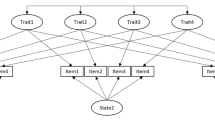Abstract
Satisfaction with life domains is more highly correlated with interpersonal than with intrapersonal comparisons (Emmons and Diener, 1985). The hypothesis of the present studies is that the high correlations reflect inferences of social comparison from global satisfaction. Paradoxically, such inferences are most likely in private domains (love life, friends), where social information is scarce and relatively unimportant as a determinant of satisfaction. Study I replicates the Emmons-Diener findings, but also finds that subjects judge recent changes more important than social standing as a determinant of life satisfaction, especially in private domains. Study II examines an order effect in judgments of satisfaction. As hypothesized the correlation between social comparison and global satisfaction is higher (in private domains only) when global satisfaction is judged first than when the order of judgment is reversed.
Similar content being viewed by others
References
Argyle, M.: 1987, The Psychology of Happiness (Methuen, New York).
Brickman, P. and Campbell, D. T.: 1971, ‘Hedonic relativism and planning the good society’, in M. H. Appley (ed) Adaptation-Level Theory: A Symposium (Academic Press, New York).
Crosby, F.: 1982, Relative Deprivation and Working Women (Oxford University Press, New York).
Diener, E.: 1989, ‘Issues in defining subjective well-being and ill-being’, unpublished manuscript (University of Illinois, Urbana-Champaign).
Diener, E.: 1984, ‘Subjective well-being’, Psychological Bulletin 95, 542–575.
Emmons, R. A. and Diener, E.: 1985, ‘Factors predicting satisfaction judgments: A comparative examination’, Social Indicators Research 16, 157–167.
Festinger, L.: 1954, ‘A theory of social comparison process’, Human Relations 7, 230–243.
Helson, H.: 1964, Adaptation Level Theory: An Experimental and Systematic Approach to Behavior (Harper & Row, New York).
Hippler, H. J., Schwarz, N. and Sudman, S. (eds): 1987, Social Information Processing and Survey Methodology (Springer-Verlag, New York).
Kahneman, D. and Miller, D.: 1986, ‘Norm theory: Comparing reality to its alternatives’, Psychological Review 93, 136–153.
Schuman, H. and Presser, S.: 1981, Questions and Answers in Attitude Surveys: Experiments on Question Form, Wording and Context (Academic Press, New York).
Schwarz, N. and Clore, G.: 1983, ‘Mood, misattribution, and judgments of well-being: Informative and directive functions of affective states’, Journal of Personality and Social Psychology 45, 513–523.
Schwarz, N. and Strack, F.: 1991, ‘Evaluating one's life: A judgment model of wellbeing’, in F. Strack, M. Argyle, and N. Schwarz (eds) Subjective Well-Being (Pergamon Press, Oxford).
Smith, R. H., Diener, E., and Wedell, D. H.: 1989, ‘Intrapersonal and social comparison determinants of happiness: A range-frequency analysis’, Journal of Personality and Social Psychology 56, 317–325.
Strack, F., Martin, L. L., and Schwarz, N.: 1988, ‘Priming and Communication: Social determinants of information use in judgments of life satisfaction’, European Journal of Social Psychology 18, 429–442.
Strack, F., Schwarz, N., Chassein, B., Kern, D., and Wagner, D.: 1990, ‘Salience of comparison standards and the activation of social norms: Consequences for judgments of happiness and their communication’, British Journal of Social Psychology 29(4), 303–314.
Tourangeau, R.: 1984, ‘Cognitive science and survey methods’, in T. B. Jabine, M. L. Straf, J. M. Tanur, and R. Tourangeau (eds) Cognitive Aspects of Survey Methodology: Building a Bridge Between Disciplines (National Academy Press, Washington D.C.).
van de Stadt, H., Kapteyn, A., and van deGeer, S.: 1985, ‘The relativity of utility: Evidence from panel data’, The review of Economics and Statistics 67, 179–187.
Author information
Authors and Affiliations
Rights and permissions
About this article
Cite this article
Fox, C.R., Kahneman, D. Correlations, causes and heuristics in surveys of life satisfaction. Soc Indic Res 27, 221–234 (1992). https://doi.org/10.1007/BF00300462
Accepted:
Issue Date:
DOI: https://doi.org/10.1007/BF00300462




